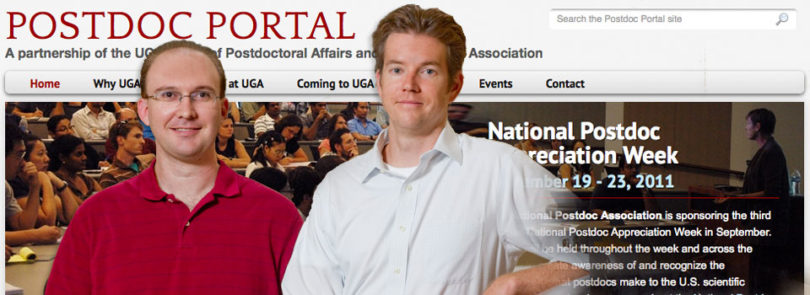Chuck Mobley, a postdoctoral scholar in UGA’s Complex Carbohydrate Research Center, has two missions. The first is to shape his own research future. The second will help shape the future of postdoctoral scholars across UGA – young investigators who represent the next generation of the scientific workforce, including academic researchers.
“My research lies at the very edge of several different fields, so in many cases, we are doing things that no one else has done,” said Mobley. Under the mentorship of Professor Jim Prestegard, Mobley uses nuclear magnetic resonance, or NMR, spectroscopy to elucidate structures of large membrane proteins or membrane protein complexes that may impact the understanding of everything from congenital heart malformations to cancer. He imagines a day when these systems are so well understood that the diseases caused by mutations within them are as easy to fix as taking a pill each morning.
Mobley’s second mission is just as ambitious: to make the UGA postdoctoral training experience truly exceptional. Fortunately, that mission also is shared by a dedicated group of UGA postdoctoral scholars who created the UGA Postdoctoral Association, or PDA two years ago. Amar Singh, department of biochemistry and molecular biology, was the first president; Mobley serves as the current PDA president.
“Postdocs live in an unrecognized state,” said Adam Barb, also a postdoc in the Prestegard lab, who uses NMR techniques to study the molecular interactions of autoimmune diseases, such as rheumatoid arthritis.
At many U.S. universities, the lack of recognition means postdocs aren’t identified as students, staff or faculty, leaving them in a career limbo that can translate into unclear policies governing their two to five years of a postdoc appointment.
UGA’s PDA set out to change that. Since their formation in January 2010, the PDA has made significant strides on behalf of the 250-plus UGA postdocs who conduct research in more than 30 departments. They garnered a seat for the PDA on the University Council, changed sick leave policy for postdocs, increased researchers’ access to periodicals, started a postdoc seminar series that increases cross-discipline connections among postdocs and earned the commitment of financial support for the series from UGA departments.
The PDA is not alone in their efforts. With PDA input, the Office of the Vice President for Research has worked to establish and improve postdoc policies and procedures, including defining criteria for postdoctoral appointees, and their terms of appointments, compensation and benefits. This summer, those efforts were formalized into the UGA Office of Postdoctoral Affairs within OVPR.
“Much of the research at UGA is performed by either graduate students or postdoctoral research scholars working under the mentorship of a faculty member,” said Robert Scott, associate vice president for research and OPA director.
“Postdocs, in particular, bring perspective and vision to the research, and often take on management roles for the research project, including training of graduate students and staff,” he said. “OVPR strives to promote recognition of the value postdocs bring to our research enterprise and to improve the quality of the work environment for them.”
OVPR has been a strong advocate for the PDA. “Both OVPR and postdocs benefit from a healthy, active PDA,” said Scott.
Most recently, the OPA-PDA partnership created a new website, the UGA Postdoc Portal, to provide information for prospective and current postdocs about UGA and living in Athens, the finer points of postdoc policies, navigating the UGA system, what to do when they arrive on campus and career guidance.
Mobley’s own motivation for dedicating many hours every week to the PDA was simple. “I was looking for a way to change some of the things that I saw hindering my research and that of my colleagues,” he said. “Increasing productivity of postdocs increases productivity of the PIs we work with,” said Mobley. “And that, in turn, raises academic and postdoctoral profiles at UGA.”
Both Barb and Mobley said they chose to come to UGA for this critical step in their career path because of the reputation of faculty and the facility where they would be working. Not far behind was the quality of life that postdocs can afford in Athens.






